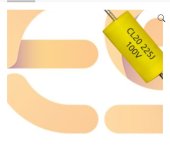Sound doesn't change it is same as other speaker.
In use, the capacitors will hold charge and that will upset the ohms measurement.
Attachments
the resistor might still have a purpose. When one leg of the resistor is connected to the capacitor and the other leg is connected to the tweeter, and a wire is bridging both legs, it might form a specific impedance network or alter the crossover slope, affecting the frequency response of the tweeter. This configuration could be part of a particular crossover design to fine-tune the audio frequencies sent to the tweeter.
That is an untypically well-worded paragraph from you, but unfortunately it's bilge!
Are you sure you are not trolling us as has been suggested elsewhere?
Are you sure you are not trolling us as has been suggested elsewhere?
Is it true or ?
I said it was bilge!
Bilge: nonsense; rubbish: "what has been written is nothing but bilge"
Ok so last option we have is we can try replacing the capasitorI said it was bilge!
Bilge: nonsense; rubbish: "what has been written is nothing but bilge"
2.2uf film one
Attachments
Sounds like your DMM is interacting with a capacitor.
I don't view that as a problem with the speaker. I view that as a problem with the test setup.
Why are you attempting to measure the DC resistance of the speaker? What problem are you having with them?
I don't view that as a problem with the speaker. I view that as a problem with the test setup.
Why are you attempting to measure the DC resistance of the speaker? What problem are you having with them?
Just to check ohms and see if it matches with my amplifier I tried checking ohms if my bookshelf speakers pair
One measures correctly 6ohms
Other 20-30
One measures correctly 6ohms
Other 20-30
If dmm is interacting with capasitor it should do on both speakers but why only one ?Sounds like your DMM is interacting with a capacitor.
I don't view that as a problem with the speaker. I view that as a problem with the test setup.
Why are you attempting to measure the DC resistance of the speaker? What problem are you having with them?
Ok so last option we have is we can try replacing the capasitor
2.2uf film one
See post #20!
Replace both capacitors and, when you have done so, report back with your findings.
What your speakers do is very natural and 100% has to be this way.
What is not natural and may do damage to your music system, is the multimeter you connect to it. Stop measuring with this toy and enjoy the music. If you are bored, go out and meet people.
What is not natural and may do damage to your music system, is the multimeter you connect to it. Stop measuring with this toy and enjoy the music. If you are bored, go out and meet people.
possibly. It depends on test conditions and the quality of your DMM.If dmm is interacting with capasitor it should do on both speakers but why only one ?
measuring DC resistance may not give you minimum impedance as speakers are a reactive load.
If the manufacturer claims they are 6 ohms, it is nominal rating across the operating frequency band and good enough for what you are attempting to do.
What is the output impedance of your amplifier?
Do the speakers work when you hook them up and play music?
I believe additional inputs and insights could indeed shed more light on the situation. Exploring different perspectives might help unravel the modifications made to the crossover and further diagnose the issue with the speaker setup.
Another post that shouts of being AI generated!
It's a brave new world indeed. 😀
NO.the resistor might still have a purpose. When one leg of the resistor is connected to the capacitor and the other leg is connected to the tweeter, and a wire is bridging both legs, it might form a specific impedance network or alter the crossover slope, affecting the frequency response of the tweeter. This configuration could be part of a particular crossover design to fine-tune the audio frequencies sent to the tweeter.
A shorted resistor is ZERO ohms and affects NOTHING.
If I drink an empty glass of wine, will it get me drunk?
Think about it.
When I asked exact same thing in another post I was reprimanded.That is an untypically well-worded paragraph from you, but unfortunately it's bilge!
Are you sure you are not trolling us as has been suggested elsewhere?
OP, post a x-over schematic, amp make and model, speaker make and model, DMM make and model and photos/procedures of/for testing.
Having done what I think you're doing, I've gotten similar results, all due to charging up a capacitor. Could also be measuring an odd artifact of impedance (not resistance, speakers are a reactive load) due to the sampling rate of the DMM (depending on the DMM design).
Having done what I think you're doing, I've gotten similar results, all due to charging up a capacitor. Could also be measuring an odd artifact of impedance (not resistance, speakers are a reactive load) due to the sampling rate of the DMM (depending on the DMM design).
Just curious, are you measuring speakers while still connected to amp output?
Because Multimeters do not actually measure ohms but a small voltage 😱
Offset voltage will be read and displayed as if it were a given ohms value.
20 to 40 "ohms" value sounds suspiciously similar to 20 to 40 mV offset, very common values.
Because Multimeters do not actually measure ohms but a small voltage 😱
Offset voltage will be read and displayed as if it were a given ohms value.
20 to 40 "ohms" value sounds suspiciously similar to 20 to 40 mV offset, very common values.
- Status
- Not open for further replies.
- Home
- Loudspeakers
- Multi-Way
- Change in ohms of bookshelf speakers

